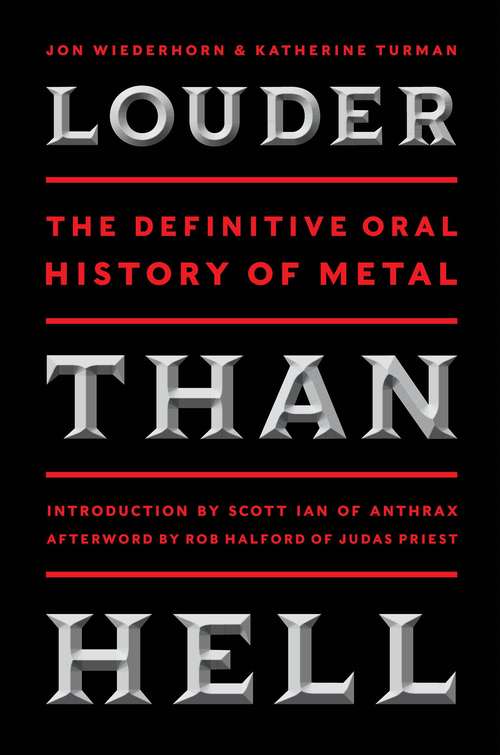Louder Than Hell: The Definitive Oral History of Metal
By: and
Sign Up Now!
Already a Member? Log In
You must be logged into Bookshare to access this title.
Learn about membership options,
or view our freely available titles.
- Synopsis
- The definitive oral history of heavy metal, Louder Than Hell by renowned music journalists Jon Wiederhorn and Katherine Turman includes hundreds of interviews with the giants of the movement, conducted over the past 25 years. Unlike many forms of popular music, metalheads tend to embrace their favorite bands and follow them over decades. Metal is not only a pastime for the true aficionados; it’s a lifestyle and obsession that permeates every aspect of their being. Louder Than Hell is an examination of that cultural phenomenon and the much-maligned genre of music that has stood the test of time. Louder than Hell features more than 250 interviews with some of the biggest bands in metal, including Black Sabbath, Metallica, Megadeth, Anthrax, Slayer, Iron Maiden, Judas Priest, Spinal Tap, Pantera, White Zombie, Slipknot, and Twisted Sister; insights from industry insiders, family members, friends, scenesters, groupies, and journalists.
- Copyright:
- 2013
Book Details
- Book Quality:
- Publisher Quality
- ISBN-13:
- 9780062099044
- Related ISBNs:
- 9780061958281, 9780061958298
- Publisher:
- HarperCollins
- Date of Addition:
- 04/23/13
- Copyrighted By:
- Jon Wiederhorn, Katherine Turman
- Adult content:
- No
- Language:
- English
- Has Image Descriptions:
- No
- Categories:
- History, Entertainment, Nonfiction, Music
- Submitted By:
- Bookshare Staff
- Usage Restrictions:
- This is a copyrighted book.
Reviews
4 out of 5
By Kyle Massey on Jul 11, 2013
As a fan of heavy metal since 1988, it's good to see more books on the subject (there were almost none back then, and certain none in an accessible form). So here we have this "oral history," which is basically a bunch of interview quotes, in paragraph form, and many previously published, tied together with short narrative sections. It almost reads like the script for a documentary, with the authors providing the voice-overs. Familiar ground is covered, including the early days of Black Sabbath, Kiss, Alice Cooper and the like in the '70's, the hair-metal years of the '80's, the birth and rise of thrash metal, and metal's decline in the early '90's. But where other books tend to end with the opening chords of "Smells Like Teen Spirit," Louder Than Hell gives us chapters on death-metal, black-metal, nu-metal, metalcore, and the New Wave of American Heavy Metal. Be forewarned though: rock 'n' roll takes a very definite backseat to sex, drugs and violence. Really, if all you knew about metal was what you read in this book, you'd think everybody involved in the scene (musicians and fans alike) were a bunch of sex-crazed, drug-addled, brawling morons. There are tons of lurid anecdotes about all of those things, and comparatively little about the actual music. Some big names are missing as well, as nobody from Iron Maiden gets much of a say, for example, except Paul DiAnno, and does he even really count? It's interesting to note how, as different as the various subgenres are, the stories are all strikingly similar. "I did so much coke, I sat there listening to my heart beating, thinking it was about to explode." "I had a quota, I had to have three girls a day, every day." "We fought all the time, backstage, on the bus, sometimes onstage." These sentiments and others recur frequently. But in the end, what can you say? It's a good guilty-pleasure, chapter-at-a-time bathroom read.
Other Books
- by Jon Wiederhorn
- by Katherine Turman
- in History
- in Entertainment
- in Nonfiction
- in Music
